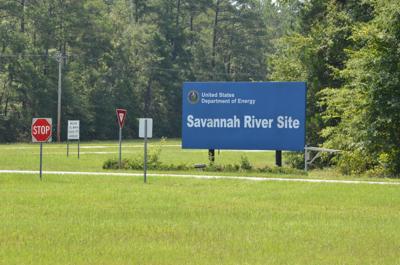Members of the Savannah River Site Citizens Advisory Board would ask the Department of Energy to consider reclassifying some types of nuclear waste in an effort to speed up disposal if a draft recommendation letter is adopted by the full board in January. The draft recommendation was approved by the Waste Management committee Tuesday evening.
The letter recommends the Department of Energy investigate the feasibility of reclassifying the two retired melters and some of the high-level glass waste canisters. The glass waste canisters are currently stored on-site in underground chambers.
Those waste canisters were stored on-site, pending the construction of a national nuclear waste repository. But with Yucca Mountain plans uncertain and no other repository named, storage space for the canisters at SRS is running low. Last year, modifications were made to the storage chambers allowing the canisters to be stacked on top of one another.
Melters are a large component used to create the glass in the canisters. The Defense Waste Processing Facility removes liquid waste from the aging tank farm, home to 43 tanks and about 35 million gallons of waste, to immobilize the waste in a glass mixture.
Melter 2 was permanently retired in February after 14 years in service. But until a repository opens that can legally handle the Melters, they will be buried in storage units at Savannah River Site.
South Carolina Sierra Club State Vice Chair Susan Corbett said she doesn’t support the recommendation as it is now.
“I'm not interested or in favor of classifying something as lower waste when it is high-level waste,” she said. “If it is something that decays in just a few years, I would be interested in looking at that. But with something remaining radioactive for thousands of years, I don’t see how in good faith we could reclassify that as lower-level waste.”
Corbett said a major concern she has with the recommendation is that it perpetuates a public opinion that much of our nuclear waste isn’t as dangerous as it is.
“I am worried about the industry-wide attempt to downplay and down designate. There is so much nuclear material in the environment now and so much is being created every day,” Corbett said.
The third melter, though, is in place and ready to be fired up. Jim Folk, the DOE’s manager of Waste Disposition at SRS, said the melter would begin the heating process Wednesday and would be ready to start operations again before Christmas.
The recommendation letter will be brought before the full board at its bi-monthly meeting Jan. 22 and 23, 2018. CAB meetings are open to the public and there is time allotted for public comment. January’s meetings will be held in Hilton Head Island.



